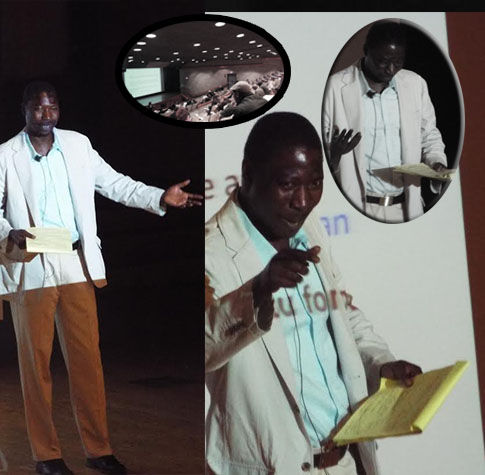Dr. Fallou Ngom, a well-versed African scholar in Ajami script and literature, lectured at the University of Massachusetts Boston in Snowden Auditorium on Oct. 24.
In his talk entitled “Ajami Sources of Knowledge & The Myth of Illiteracy of Africa,” Ngom mentioned his fight for proper recognition of Ajami script and literature. He defied the Europeans’ portrayal of Africans Scholars and he challenged the western scholar’s approach of defining literacy.
“Literacy is defined as the ability to write and read in European or Arabic languages only. This is grossly inaccurate,” Ngom said, implying that such definition of literacy only serves to promote the dominant culture of literary and suppresses the Africans’ literature. He explained that a person’s intellectual ability cannot, neither should, be measured on the basis of his ability to read or write in a particular language.
According to Ngom, Ajami is a West African language, similar to Arabic, that has been overlooked because most of the scripts were written by African scholars. Ajami was especially used during the pre-colonial period, when Qur’anic schools taught Muslim children Arabic, Ajami. Ngom, in his digging of Ajami script, found over 350 millions of written scripts.
“There are several factors explaining the lack of interest in these scripts,” explained Ngom. One is “the widespread assumptions that useful language and knowledge on Africa is either oral or in European language or in Arabic.”
Another factor keeping Ajami from being recognized as a language Ngom stated is the racist assumptions of both Arab-centric and Euro-centric scholars who believe that the writing of black Africans have no scientific value.
Ngom went on to defy those assumptions by claiming that Ajami does have scientific value but there are misrepresentations and misunderstandings of African languages. “Some modern Western scholars treat [Ajami scripts] as non-readable,” Ngom lamented.
“We hope to help train the first generation of American scholars to have direct access in the wealth of knowledge in West African literature of Ajami,” said Boston Pan-African Forum President, Joyce Hope Scott, during her introduction of Professor Ngom.
This lecture on Ajami was part of the fourth Annual Fall Reception of Boston Pan-African Forum. Several prominent Africans scholars, activists, and teachers, including others with interest in Africa, gathered to discuss a number of issues relating to African-Americans, Africans, and the continent of Africa.
Professor Robert Johnson Jr., Chair of the African Studies Department at UMass Boston, welcomed the audience. In his brief remarks, Johnson mentioned some of the involvements of the Pan-African community, including some of the UMass Boston professors of the African Studies engaged in promoting social justice. “We are not only scholars, but also activists,” he stated.
Ngom said that the next step is to keep collecting those Ajami scripts then make them available and accessible to people from every corner of the globe. He also mentioned the need for African scholars and African leaders to start promoting their own culture of literacy and to embrace their indigenous literature.
Dr. Fallou Ngom is an Associate Professor and Director of the African Language Program at Boston University.
African Scholar is fighting for proper recognition of Ajami script and literature
November 14, 2014

Dr. Fallou Ngom at University of Massachusetts Boston, Snowden Auditorium.




















































